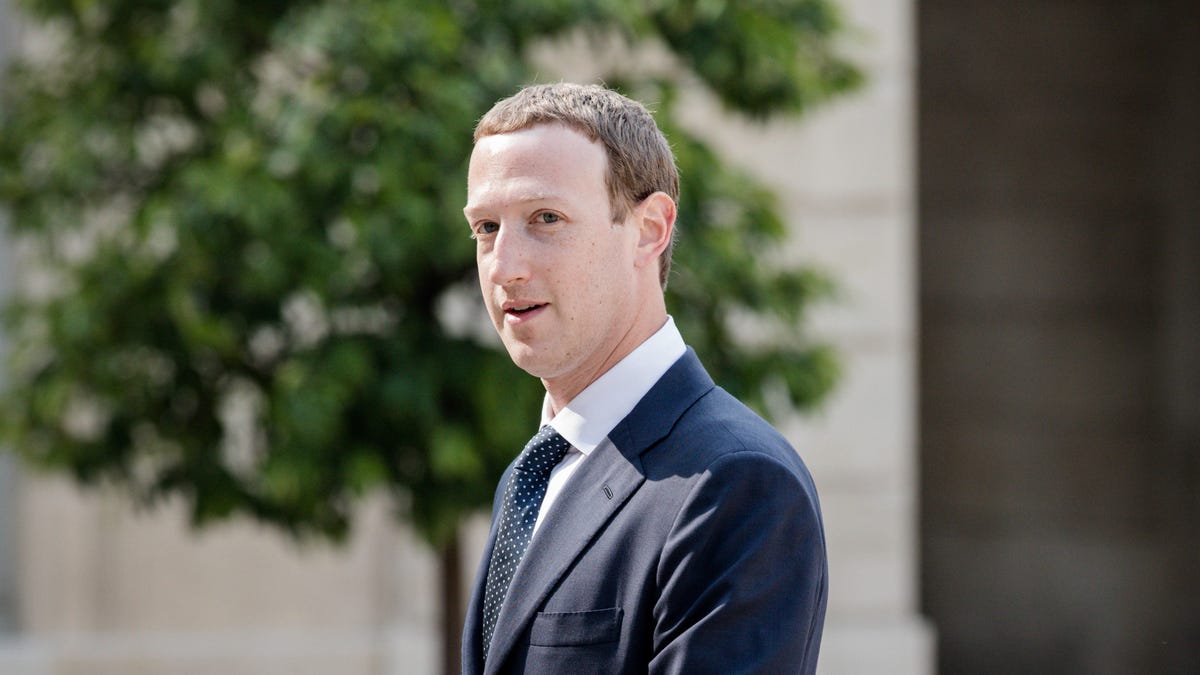Mark Zuckerberg 'confident' Facebook is prepared for 2020 election
In a TV interview, the social network chief says the company "has learned a lot" since the last presidential vote.

Mark Zuckerberg arrives at the Elysee Palace in Paris last May to meet with French President Emmanuel Macron.
Facebook has failed to thwart election meddling before, but the 2020 US presidential election will give the social network another chance to demonstrate it's on the right track.
CEO Mark Zuckerberg said his company has "learned a lot" since the 2016 election, which Russia meddled in by having trolls post divisive content to the platform. In an interview with ABC's Good Morning America on Thursday, Zuckerberg said he's "confident" his company is ready to combat any election interference in the upcoming campaign season.
Facebook has strengthened its safeguards, requiring advertisers to verify their identities if they run political ads. It's also rolled out a searchable database showing who paid for advertising and what audience it reached.
"The systems, overall, have just gotten quite robust," Zuckerberg said. "I think we, at this point, have probably some of the most-advanced systems of any company or government in the world for preventing the kind of tactics that Russia and now other countries as well have tried."
The changes haven't been without issues; businesses have complained that their commercial ads have been misclassified, and media outlets have found loopholes that can be exploited.
The Facebook chief used the interview to push back against the idea that his company should determine what constitutes political speech. He's previously called for more government regulation around political speech and advertising.
"I think setting the rules around political advertising is not a company's job," he told host George Stephanopoulos. "There have been plenty of rules in the past. It's just at this point they're not updated to the modern threats that we face. We need new rules."
The topic has been on the minds of Facebook's leadership and of social media watchers in recent days. Over the weekend, The Washington Post published a Zuckerberg op-ed that urged government officials to take a more active role in setting standards for the handling of election-related content, both legitimate and ill-intentioned.
Meanwhile, lawmakers like Sen. Mark Warner, a Virginia Democrat, have said that big platforms like Facebook should be subject to levels of regulation that match their size and influence. Facebook has more than 2 billion users worldwide.
Existing laws, he said, primarily focus on a candidate and the election. "But that's not primarily what we saw Russia trying to do," Zuckerberg said. "What we saw them doing was talking about divisive political issues. The goal ... was just to rile people up and be divisive."
Zuckerberg also warned that other countries would likely try to interfere in the election.
"Well, what I can guarantee is that they're definitely going to try," he said. "Our job is to make the defenses stronger and stronger, to make it harder for them to do what they're doing."
Other scandals
Facebook's controversies are about more than just politics.
On Wednesday, security researchers from UpGuard found that Facebook data containing more than 540 million records was posted in a public database on Amazon cloud servers.
When asked about the findings from the security researchers, Zuckerberg said the company was still looking into the issue.
"In general, we work with developers to make sure that they're respecting people's information and using it in only ways that they want," he said.
Facebook also drew criticism over the use of its livestreaming service during a terrorist attack in New Zealand that killed 50 Muslims at two mosques. Zuckerberg suggested that delaying livestreams might have consequences for users who don't stream violent content.
"It would also fundamentally break what livestreaming is for people," he said. "Most people are livestreaming, you know, a birthday party or hanging out with friends when they can't be together."
Facebook declined to comment beyond what Zuckerberg said during the broadcast.
Originally published April 4, 7:27 a.m. PT.
Updates, 7:57 a.m.: Adds background information and more details from the interview; 12:41 p.m.: Includes more details from the interview.



